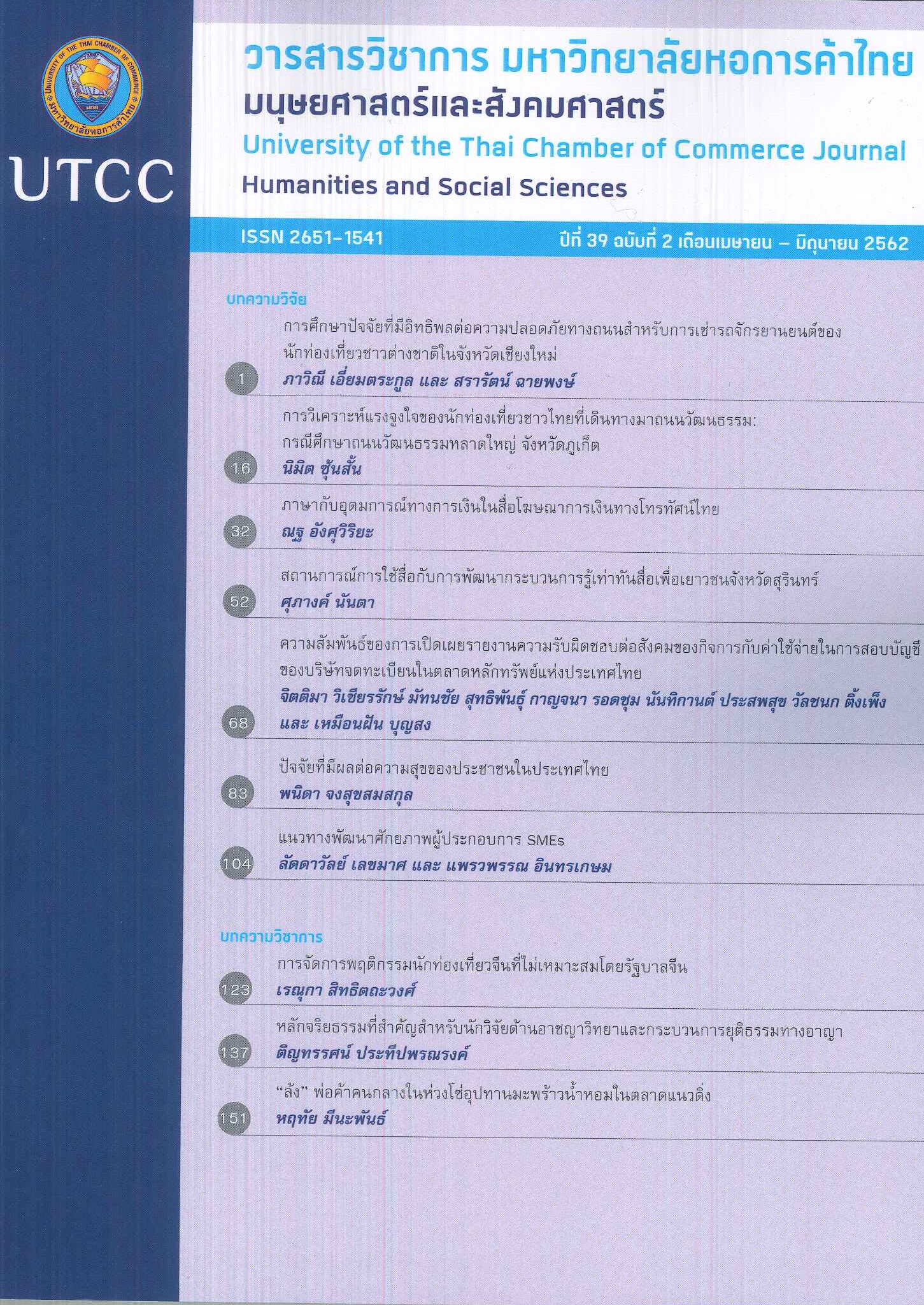Language and Financial Ideology in Financial Advertisements on Thai Television
Main Article Content
Abstract
The objectives of the study are to analyze the relationship between language and ideology in financial transaction advertisements on Thai television dealing with saving and getting a loan. Data in the study was collected from 77 financial transaction advertisements from 2015 to 2016 applying the descriptive analysis and analyzing linguistic strategies. Findings revealed an important ideology, i.e. financial ideology. Analyzing language used in the advertisements revealed financial ideology of the importance of money. In addition, linguistic strategies employed in the study also revealed financial ideology in terms of having a better life shown in advertisements including values of life, houses and cars, business and family. The linguistic choices that the producers used in the study also showed three important concepts, which are the financial institutes being constructed as givers, authorities, and supporters. Financial institutes and advertising companies played an important role in constructing the image of having better quality of life on audiences. This is because having a better life quality relating to finance that the media keeps on reproducing plays an important role in the audience’s perceptions towards carrying out financial transaction as carefully planned by media producers.
Article Details
ลิขสิทธิ์ของบทความ
ผลงานที่ได้รับการตีพิมพ์ถือเป็นลิขสิทธิ์ของมหาวิทยาลัยหอการค้าไทย ห้ามมิให้นำเนื้อหา ทัศนะ หรือข้อคิดเห็นใด ๆ ของผลงานไปทำซ้ำ ดัดแปลง หรือเผยแพร่ ไม่ว่าทั้งหมดหรือบางส่วนโดยไม่ได้รับอนุญาตเป็นลายลักษณ์อักษรจากมหาวิทยาลัยหอการค้าไทยก่อน
References
จริยา ปันทวังกูร. (2551). การเขียนบทโฆษณา. กรุงเทพฯ: จุฬาลงกรณ์มหาวิทยาลัย.
ชนกพร อังศุวิริยะ. (2560). วาทกรรมการเงิน: สินเชื่อจากสื่อโฆษณาทางโทรทัศน์. วารสารมนุษยศาสตร์และสังคมศาสตร์ มหาวิทยาลัยราชพฤกษ์, 3(1), 95-106.
ไทยรัฐ. (2560) . หนี้ครัวเรือนติดอันดับโลก กู้ใช้จ่ายส่วนตัว-ซื้อรถจนหมดปัญญาผ่อน. (2560, 27 มิถุนายน). ไทยรัฐออนไลน์. สืบค้นจาก https://www.thairath.co.th/content/984923
รัตติยา อังกุลานนท์. (2559, 5 สิงหาคม). คนไทยดูทีวีเพิ่ม ‘ช่องดิจิทัล ’แบ่งเค้ก ‘ผู้ชม-โฆษณา’ กรุงเทพธุรกิจออนไลน์. สืบค้นจาก https://www.bangkokbiznews.com/news/detail/710923
วิไล อักขระสมชีพ. (2560, 26 พฤษภาคม). คลินิกแก้หนี้ ไม่ใช่ยาวิเศษ แต่เพิ่มออกซิเจนทางการเงิน. ประชาชาติธุรกิจออนไลน์. สืบค้นจาก https://www.prachachat.net/news_detail.php?newsid=1495698043
Brand Buffet. (2559). อุตสาหกรรมโฆษณาปี 59 ติดลบ 10% สื่อต้องปรับตัวเพื่ออยู่รอดในปี 60. สืบค้นเมื่อ 6 เมษายน 2560, จาก https://www.brandbuffet.in.th/2016/11/media-spending-2559-maat-overall/
Sarunjade. (2560). สถิติชี้! คนไทยมั่นใจชำระเงินผ่าน E-payment มากขึ้น บอกถือเงินสดนั้นทั้งอันตรายทั้งไม่สะดวก. สืบค้นเมื่อ 8 พฤศจิกายน 2561, จาก https://www.marketingoops.com/reports/behaviors/thai-choose-to-pay-through-e-payment-more/
Cook, G. (1992). The discourse of advertising. London, England: Routledge.
Cotter, C. (2001). Discourse and media. In D. Schiffrin, D. Tannen, & H. E. Hamilton (Eds.), The handbook of discourse analysis (pp. 417- 435). Malden, MA: Blackwell.
Fairclough, N. (2006). Language and globalization. London, England: Routledge.
Hodge, R, & Kress, G. (1993). Language as ideology (2nd ed.). London, England: Routledge.
Kress, G. (1985). Ideological structures in discourse. In T. A. van Dijk (Ed.), Handbook of discourse analysis: Discourse in society: Vol. 4 (pp. 27–43). London, England: Academic Press.
Leibbrand, M. P. (2015). The language of executive financial discourse. Studies in Communication Sciences, 15(1), 45-52.
Mitchell, W.J.T. (1986). Iconology: Image, text, ideology. Chicago, IL: University of Chicago Press
Mooney, A., Pccei, J. S., Labelle, S., Henriksen, B. E., Eppler, E., Irwin, A., … Soden, S. (2011). Language, society and power: An introduction (3rd ed.). London, England: Routledge.
O’Halloran, K. (2003). Critical discourse analysis and language cognition. Edinburgh, England: Edinburgh University press.
van Dijk, T. A. (1998). Ideology: A multidisciplinary approach. Thousand Oaks, CA: Sage.
van Dijk, T. A. (2013). Ideology and discourse. In M. Freeden, L. T. Sargent, & M. Stears (Eds.), The Oxford handbook of political ideologies (pp. 175-196). Oxford, England: Oxford University Press
van Dijk, T. A. ( 2011). Discourse and ideology. In T. Van Dijk (Ed.), Discourse studies: A multidisciplinary introduction (2nd ed.) (pp. 379-407). Los Angeles, CA: Sage.
Widdowson, H.G. (2007). Discourse analysis. New York, NY: Oxford University Press.
Wodak, R, & Fairclough, N. (1997). Critical discourse analysis. In T. A. van Dijk (Ed.), Discourse studies: A multidisciplinary introduction: Vol. 2 (pp. 258-284). London, England: Sage.
Wooffitt, R. (2005). Conversation analysis and discourse analysis. London, England: Sage.


